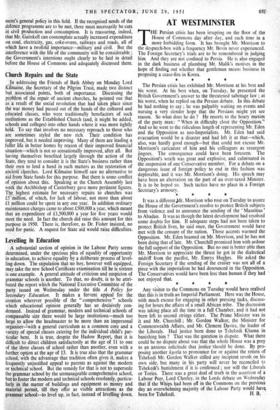AT WESTMINSTER
THE Persian crisis has been irrupting on the floor of the House of Commons day after day, and each time in a more forbidding form. It has brought Mr. Morrison to the despatch-box with a frequency Mr. Bevin never experienced. The Foreign Secretary's trials are to be remembered in judging him. And they are not confined to Persia. He is also engaged in the dark business of plumbing Mr. Malik's motives in the hope of finding out whether that gentleman means business in proposing a cease-fire. in Korea.
* * * * The Persian crisis has exhibited Mr. Morrison at his best and his worst. At his best when, on Tuesday, he presented the British Government's answer to the threatened sabotage law : at his worst, when he replied on the Persian debate. In this debate he had nothing to say ; he was palpably waiting on events and nursing a very slender hope that the Persians might yet see reason. So what does he do ? He resorts to the hoary maxim of the party man: "When in difficulty clout the Opposition." And so he went to the ridiculous length of representing Mr. Eden and the Opposition as neo-Imperialists. Mr. Eden had said evacuation would be a disaster and had left it at that—which. also, was hardly good enough—but that could not excuse Mr. Morrison's caricature of him and his colleagues as resurgent jingoes. The consequence could have been foreseen. The Opposition's wrath was great and explosive, and culminated in the suspension of one Conservative member. For a debate on a dangerous issue of foreign policy to end in this fashion was deplorable, and it was Mr. Momson's doing. His speech may have been an aberration on the part of an over-taxed Minister. It is to be hoped so. Such tactics have no place in a Foreign Secretary's armoury. * * * * It was a differentjv1r. Morrison who rose on Tuesday to assure the House of the Government's resolve to protect British subjects from violence and to announce the sending of the ' Mauritius ' to Abadan. It was as though the latest development had resolved some doubts for him. If adequate steps had not been taken to protect British lives, he said once, the Government would have met with the censure of the nation. Those accents warmed the Opposition. Mr. Eden beamed on Mr. Morrison, and he has not been doing that of late. Mr. Churchill promised him with ardour the full support of the Opposition. But no one is better able than Mr. Morrison to appreciate the thrust he got in the dialectical midriff from the pacifist, Mr. Emrys Hughes. He asked the Foreign Secretary if the sending of the cruiser was not all of a piece with the imperialism he had denounced in the Opposition. The Conservatives would have been less' than human if they had not enjoyed that. • * * * * Any visitor to the Commons on Tuesday would have realised that this is in truth an Imperial Parliament. Here was the House. with much excuse for engaging in other pressing tasks, discuss- ing for hours the affairs of a small African tribe. The discussion was taking place all the time in a full Chamber, and it had not been left to second strings either. The Prime Minister was in it and Mr. Churchill ; Mr. Gordon Walker, the Minister for Commonwealth Affairs, and Mr. Clement Davies. the leader of the Liberals. Had justice been done to Tshekedi Khama in banishing him ? That was the question in dispute. What there could be no dispute about was that the whole House was a prey to an anxious solicitude that justice 'should be done. By pro- posing another kgotla to pronounce for or against the return of Tshekedi Mr. Gordon Walker stilled any incipient revolt on his own side, but many in his party will never be reconciled to Tshekedi's banishment if it is confirmed • nor will the Liberals or Tories. There was a great deal of truth in the assertion of a Labour Peer, Lord Chorley, in the Lords debate on Wednesday that if the Whips had been off in the Commons on the previous day an overwhelming majority of the Labour Party would haw;


































 Previous page
Previous page